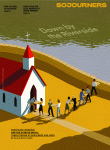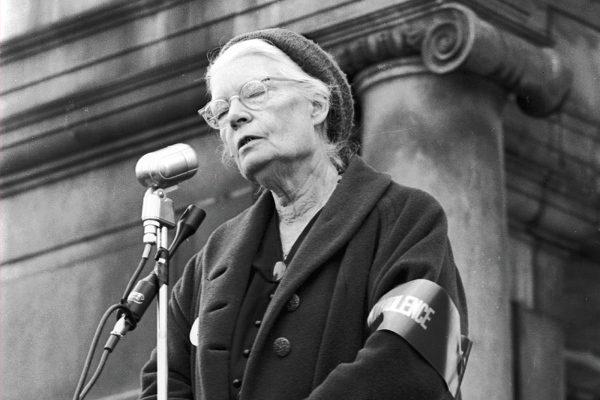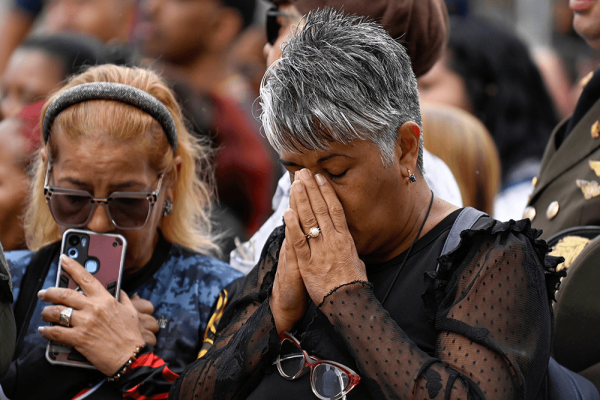WHEN POPE FRANCIS addressed Congress during his 2015 visit to the U.S., he named four great men and women whose legacies helped shape the fundamental values of the American people: Abraham Lincoln, Martin Luther King Jr., Thomas Merton, and Dorothy Day, the Catholic social activist and pacifist. It was among his most audacious statements during the trip, and he got away with it because—outside of churches and the peace movement—Dorothy Day, the woman who could become America’s next saint, is largely unknown.
Revolution of the Heart: The Dorothy Day Story, a new documentary film by Martin Doblmeier, wants to put that right. More than a biography, this tapestry of archival footage and new interviews—which include Day’s granddaughters, plus devotees such as Martin Sheen and Sister Joan Chittister—is narrative theology, an argument for why an anarchist grandma could be a patron saint for those countering Trump’s America. “Dorothy Day spoke out publicly and forcefully in support of fair pay for workers, against the great imbalance of wealth, excessive expenditures for weapons, nuclear proliferation, and unjust wars overseas. We struggle with these same issues today,” Doblmeier tells me. He believes her life story is a roadmap, a spiritual guide for troubled times.
The film opens not with Day’s birth in 19th century Brooklyn, nor the years before her conversion, which she spent darting from bohemian parties to inner-city Masses, but in the 1950s, when the Catholic Worker movement she co-founded as a network of “houses of hospitality” took to the streets to protest the arms race. We see Day’s Catholic personalism—her belief that Christians must take personal moral responsibility for injustice—in action, and it is bracing and alienating. We meet her isolated from the Catholic Church: a voice crying in the wilderness. Doblmeier’s nods toward contemporary politics make this a challenging introduction. “I think Dorothy Day presents a direct path that we all can take,” he explains. “She believed if you see someone in need, you fix it yourself. You don’t wait for the government or a social service agency to intervene.”
Doblmeier, a Catholic, treats Day’s faith with respect, exploring her criticisms of the church while stressing her obedience to tradition. The film skips back in time to trace Day’s spiritual wandering, her battle with and eventual surrender to faith, a process thoughtfully unpacked by one of her biographers, Robert Ellsberg, and Chittister. Convinced that the Catholic Church is “the church of the poor,” she still felt she was “going over to the opposition” by joining an institution so aligned with property and capitalism. She resolved that tension at Mass, as activist and philosopher Cornel West observes in a typically insightful contribution: “When she is partaking of the body and blood of Jesus, she is tied to the memory of the blood of those made in the image of God, especially the weak and vulnerable. And so there is a political dimension to this profoundly liturgical act.”
“She wasn’t, as people might think, a religious leftist,” Jim Wallis explains. “She was radical in her social, economic, political views because of her conservative faith.” Day’s liturgical traditionalism is one of her challenges to modern Catholicism, where “RadTrads” (radical traditionalists) and political radicals are on opposite sides of the altar. Day was afraid that becoming a Catholic meant turning her back on social radicalism, until she met Peter Maurin, the French social activist with whom she would create the Catholic Worker, who introduced her to the Catholic social teaching that became her entire vocation. “Her life was instinctual,” Martin Sheen reflects. “She’d see someone fall, she’d help them up. She saw someone hungry, she’d feed them.”
A life of such profound integrity was not without cost: One of Day’s granddaughters (and biographers), Kate Hennessy, defends her in the movie against pervasive allegations that she was an indifferent mother, more interested in the growing network of Catholic Worker houses and farms than in her daughter, Tamar. The movement lost much Catholic support during World War II when Day refused to compromise her pacifism to endorse just war theory, a position she maintained until her death. A grueling schedule of speaking engagements and a series of heart attacks took their toll, and, by the late 1970s, Day was forced to slow down: “For a woman of such power and such strength to have to submit to that aging process, it broke my heart to see that happening,” remembers another granddaughter, Martha Hennessy, in the film’s moving conclusion.
Day’s cause for sainthood was opened in 2000, 20 years after her death; it took until 2016 for the Catholic Church to open a formal inquiry into her life. Perhaps it is no surprise that it would tread slowly around a woman who spoke about her experience of abortion and never married, who was as critical of clerics as she was of free-loving hippies. Now her canonization rests on a Rome-ratified miracle. Until that day comes, Doblmeier’s beautiful documentary is an inspiring call to those fighting the spread of nationalism and racism in their own time to become themselves the miraculous answers to Day’s prayers, whispered before the Blessed Sacrament and shouted across the streets of New York City and around the world.

Got something to say about what you're reading? We value your feedback!







